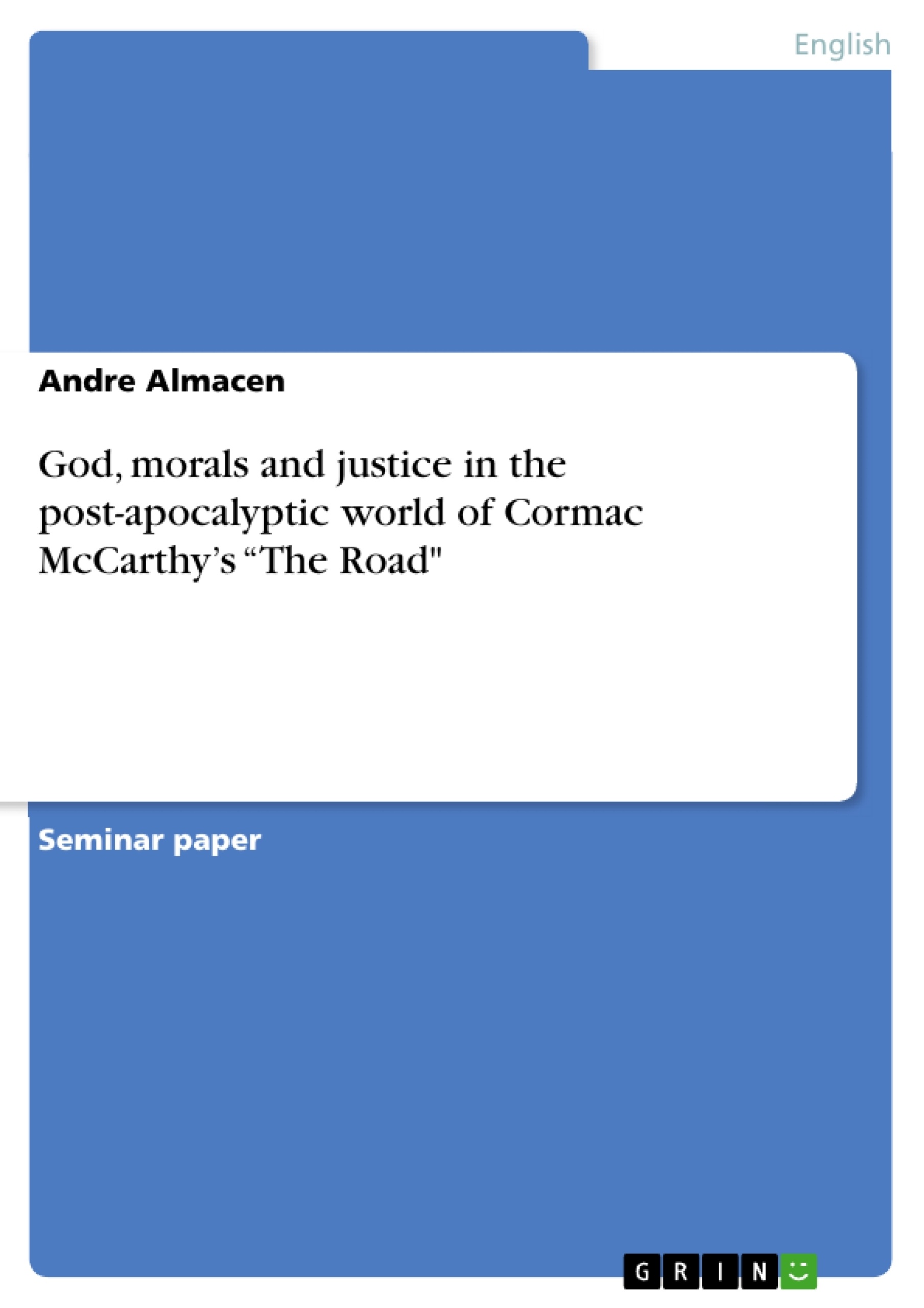In this paper I want to discuss on how Cormac McCarthy treats the topics God, morals and justice in the post-apocalyptic setting of his prize-winning novel The Road and give insight on how these constructions work in general.
Inhaltsverzeichnis (Table of Contents)
- 1. The Post-Apocalypse in The Road
- 2. God, Morals and Justice in The Road
- 2.1. God in a godless world
- 2.2. The way of the good guys
- 2.3. The connection between godly and good people
- 3. Is The Road a realistic prediction of the end of humanity?
Zielsetzung und Themenschwerpunkte (Objectives and Key Themes)
This paper examines Cormac McCarthy's The Road, analyzing the author's portrayal of God, morality, and justice within a post-apocalyptic setting. The analysis explores how these concepts function in the novel's extreme circumstances and considers the implications for human behavior and survival.
- The role of faith and belief in a godless world.
- The struggle between morality and survival in extreme conditions.
- The ambiguous presence or absence of divine intervention.
- The implications of a society devoid of traditional structures and laws.
- The contrasting perspectives on God and morality among different characters.
Zusammenfassung der Kapitel (Chapter Summaries)
1. The Post-Apocalypse in The Road: This chapter introduces the desolate post-apocalyptic world of The Road, characterized by destruction, societal collapse, and the struggle for survival. McCarthy depicts a landscape devoid of traditional morality, where acts like murder and cannibalism become necessary for survival. The chapter establishes the central conflict: the father and son's adherence to goodness amidst pervasive evil and the question of whether inherent human morality can rebuild society after a catastrophic reset.
2. God, Morals and Justice in The Road: This chapter delves into the complex interplay of God, morality, and justice in McCarthy's narrative. The existence of God is questioned in a world consumed by suffering and violence. The chapter analyzes contrasting perspectives on faith, examining the father and son's unwavering belief against the cynicism of other characters who've abandoned hope. The chapter explores how the absence of God impacts the moral compass of survivors, leading to actions that violate established ethical boundaries. It also explores the subtle hints of divine intervention throughout the story, raising questions about fate, chance, and the potential for redemption. The chapter uses the father's faith as a central example, suggesting that his belief in God, even in the face of overwhelming despair, provides him with the strength to persevere and protect his son. It uses the contrasting view of the blind man who is disillusioned and accepts the end of humanity.
3. Is The Road a realistic prediction of the end of humanity?: This chapter would likely explore the novel's plausibility as a potential future scenario. It would analyze the societal breakdown portrayed, comparing the societal and ethical issues raised in the novel with the potential realities of a post-apocalyptic society. The chapter could discuss the various themes present in the novel.
Schlüsselwörter (Keywords)
Post-apocalyptic literature, morality, justice, faith, God, survival, human nature, societal collapse, divine intervention, good versus evil, Cormac McCarthy, The Road.
Frequently Asked Questions: Cormac McCarthy's *The Road*
What is the purpose of this document?
This document provides a comprehensive preview of an academic paper analyzing Cormac McCarthy's The Road. It includes a table of contents, objectives and key themes, chapter summaries, and keywords. The preview is intended for academic use, facilitating the analysis of themes in a structured and professional manner.
What are the main themes explored in the analysis of The Road?
The analysis focuses on the portrayal of God, morality, and justice within the novel's post-apocalyptic setting. Key themes include the role of faith in a godless world, the struggle between morality and survival, the ambiguous presence or absence of divine intervention, the implications of societal collapse, and contrasting perspectives on God and morality among different characters.
What are the chapter summaries included in the preview?
Chapter 1 introduces the desolate post-apocalyptic world and the father and son's struggle for survival amidst pervasive evil. Chapter 2 delves into the complex interplay of God, morality, and justice, analyzing contrasting perspectives on faith and exploring the impact of God's absence on moral behavior. Chapter 3 explores the plausibility of The Road as a potential future scenario, examining societal breakdown and ethical issues.
What is the overall objective of the academic paper?
The paper examines how concepts of God, morality, and justice function in the extreme circumstances of The Road's post-apocalyptic world and considers the implications for human behavior and survival. It aims to analyze the author's portrayal of these concepts and their impact on the characters and the narrative.
What are the keywords associated with the analysis of The Road?
Keywords include post-apocalyptic literature, morality, justice, faith, God, survival, human nature, societal collapse, divine intervention, good versus evil, Cormac McCarthy, and The Road.
What specific aspects of faith and belief are examined in the analysis?
The analysis explores the role of faith and belief in a godless world, focusing on the father and son's unwavering belief contrasted with the cynicism of other characters. It examines how faith influences moral choices and provides strength in the face of despair.
How does the analysis address the concept of morality in the novel?
The analysis investigates the struggle between morality and survival in extreme conditions. It explores how the absence of traditional societal structures and laws impacts moral decision-making and leads to actions that violate established ethical boundaries. It also examines the contrasting perspectives on morality among different characters.
How does the paper address the plausibility of the post-apocalyptic setting?
The paper analyzes the societal breakdown depicted in the novel and compares the ethical and societal issues raised with potential realities of a post-apocalyptic society. It assesses the novel's plausibility as a potential future scenario.
- Arbeit zitieren
- Andre Almacen (Autor:in), 2011, God, morals and justice in the post-apocalyptic world of Cormac McCarthy’s “The Road", München, GRIN Verlag, https://www.grin.com/document/187799



